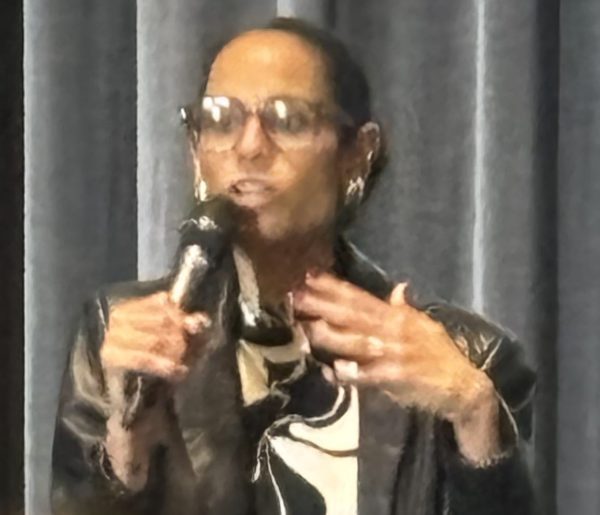A Montclair State professor who specializes in trauma-related social work called on William Paterson students at an annual conference to “find your joy” in order to navigate a world that she described as unsafe, inequitable, and “sometimes really harsh.”

Delivering the keynote address at William Paterson’s Contexts conference on Oct. 24, Dr. Laura Quiros encouraged young people to cope by actively listening to each other’s experiences and “committing to this conversation” respectfully and sensitively.
“I want you to find your joy in all of that,” Quiros said, “because if you don’t find your joy, you’re not going to be able to thrive in these spaces.”
Quiros outlined her “adverse childhood experience,” including discrimination that she faced as a “Black Latino who’s also Jewish” and her brother’s death from Sudden Infant Death Syndrome. Her “intersecting identities” and “very multicultural background,” with a Puerto Rican and Venezuelan father and a white Jewish mother of Polish descent, led her to challenge racism and anti-Semitism.
“My takeaway from all of that life experience is, How do I create spaces of inclusion as I know what it feels like to be excluded?” Quiros said.
She added, “I think it led me to this work of trauma, and I wanted to bring people like me into that world and understand.”
Quiros told the audience that she was “intentional about how I present myself to you today” to establish credibility. She asked the crowd, “When you’re sitting with each other, how much of yourself do you let each other know about?”
Quiros advised students to be conscious and reflective “about what and why you are choosing to share.”
“Some of you may be more extroverted in your classes, and some of you may fall back,” she said. “But for those of you that are extroverted, are you noticing your classmates that don’t speak? Are you pulling them in from the place of love because you don’t want to take up too much space?”
She encouraged the audience to embrace discomfort.
“It’s a really bad feeling to feel uncomfortable,” she said. “When I’m uncomfortable, I feel it in my stomach, I feel it in my head and body, and I have to push through that. Some of the things we’re experiencing in the world today are really uncomfortable. And how are you really sitting with that? How are you using yourself and how are you also finding your own influence to create social change and to create trauma-informed spaces?”
Quiros cited her degrees in social welfare, psychology, and philosophy to demonstrate her belief in interdisciplinary work.
“That’s where we get our power,” she said. “We do not get our power from just staying in our silos but from being experts in who we are.”
Quiros asked the audience to talk with each other about their experiences related to diversity and privilege.
“The ways we’ve been socialized often dictate how we show up in the world,” she said. “If we were brought up in a home with parents who did not believe in becoming friends with people who were different than you, then we’re not going to gravitate towards that.”
Quiros said she believes that awareness can provide insight to “how traumatic experiences overwhelm your whole being” but can be “an opportunity to go deeper, to learn something new, to change our perspective.”